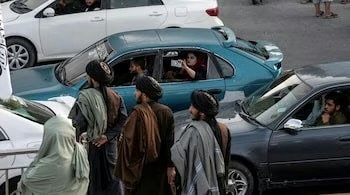When the Taliban seized power in Afghanistan on August 15, 2021, following the withdrawal of U.S. forces, life for Afghan women changed overnight. Schools, universities, workplaces, gyms, and public parks closed their doors to them. Poetry recitals and even public prayers became forbidden. With nearly 100 edicts now governing their lives, experts describe the situation as a form of gender apartheid—a systemic erasure of women from public life.
Yet, while Afghan women face increasing restrictions, a surprising phenomenon has emerged: tourism in Afghanistan is booming, fueled largely by travel influencers who are painting a radically different picture of the country.
Influencers Portraying a ‘Different Afghanistan’
Travel influencers from the U.S., Europe, and Australia are flocking to Afghanistan, sharing content that showcases waterfalls, bustling bazaars, and ornate mosques, often presenting the country as safe and welcoming.
One viral clip by @iampocoloco even begins with a fake hostage scene before cutting to scenic landscapes, framing the country as a place of adventure and surprise. German influencer Margaritta told NBC News she felt “fantastic” during her trip and claimed she was “treated like a queen,” adding that Taliban laws on women made them “valued as precious.”
British travel vlogger Zoe Stephens shared that her experience showed “a lot more nuance” than global media typically portrays, while Australian influencer Chloe Baradinsky called her visit “an incredible experience,” describing locals as kind and the environment as safe.
Canadian influencer Nolan Saumure posted a video titled Afghanistan Has Too Much Testosterone, joking about the country being “all dudes, bro-ing the f**k down.” Meanwhile, Keith Sinclair told CNN that his trip “blew his expectations out of the water.”
Their glowing portrayals have helped increase tourism. According to Afghanistan’s Deputy Minister of Tourism Qudratullah Jamal, the country saw nearly 9,000 foreign visitors last year, including 3,000 in just the first quarter of this year.
The Taliban’s Interest and Influencers’ Motives
So why is tourism thriving under one of the most restrictive regimes in modern history?
For many influencers, the answer lies in money and viral content. Travel creator Don Broussard (@thebeardedbackpacker) told UnHerd that posting videos from Afghanistan “is a good way for an influencer to build a bigger following,” with some earning $1,000 or more from a single viral clip.
For the Taliban, these influencers offer something even more valuable: image-building. According to Newcastle-born traveler Curt Jones, “The Taliban wanted as many influencers to visit as possible. Their assumption was that almost everyone was creating content.”
By presenting Afghanistan as hospitable and picturesque, these videos serve as soft propaganda—rebranding a country notorious for human rights abuses into a destination for adventure tourism.
The Reality Behind the Videos: A Dangerous White-Washing
Afghan activists and researchers warn that such portrayals distort the grim reality of life under Taliban rule.
Orzala Nemat, visiting fellow at the Royal United Services Institute (RUSI), told NBC News:
“What we’re seeing instead is a curated, sanitised version of the country that conveniently erases the brutal realities faced by Afghan women under Taliban rule.”
She emphasised that smiling women in influencer videos should “never be confused with contentment or consent,” calling the trend “neocolonial tourism dressed up as adventure.”
British-based Afghan researcher Nazifa Haqpal echoed similar concerns in an interview with RFE/RL, warning:
“These videos are dangerous and distort the truth. The truth under the Taliban’s cruel rule is dark, bleak, and ugly.”
Afghan women themselves feel betrayed. Arezo, a young woman from Bamiyan, told Radio Azadi that influencers are helping the Taliban “whitewash oppression” while women’s conditions worsen daily.
The Harsh Reality for Afghan Women
Since 2021, the Taliban has systematically stripped away the rights of Afghan women and girls. Among the most devastating measures:
Education Ban – Girls have been banned from secondary schools and universities. Employment Restrictions – Women are barred from working in NGOs, the UN, or most public-facing jobs. Freedom of Movement – Women face severe restrictions in travel and public appearances, requiring a male guardian for many activities. Public Life Erasure – Parks, gyms, and cultural gatherings are off-limits, further pushing women into isolation.
The United Nations recently warned that Afghan women face “total exclusion” from society—a warning echoed by Afghan journalist Zahra Nader, editor of Zan Times, who said:
“Women in Afghanistan have been deprived of their basic human rights.”
The Ethics of Tourism in Crisis Zones
This growing trend raises critical ethical questions: Should tourism flourish in a country where half the population lives under systemic oppression?
Afghanistan’s ambassador to Austria, Manizha Bakhtari, offered a powerful reminder in an interview with Fox News:
“While Afghanistan is breathtakingly beautiful, beauty should not blind us to injustice. Travel should open hearts, not close eyes.”
Critics argue that influencer-led tourism—without context—normalizes authoritarian rule and trivializes human suffering, reducing a complex crisis into Instagrammable moments.
A Country of Contradictions
Afghanistan remains a land of extraordinary landscapes, ancient history, and deep cultural richness. Yet, for Afghan women, it is also a place of unprecedented restriction and fear.
Tourism may provide much-needed economic relief, but unless narratives shift to reflect the full truth, these trips risk turning into acts of complicity—where beauty masks brutality, and adventure becomes exploitation.
The challenge now lies not in whether people should visit Afghanistan, but how they choose to tell its story. Until Afghan women regain their voice and freedom, no amount of scenic imagery can capture the nation’s reality.
